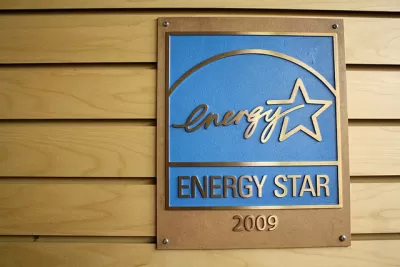As details emerge from the Trump Administration's draft budget proceedings, more programs of relevance to the planning profession are queued up for the chopping block. The budget is still far from a done deal, however.

"A preliminary budget proposal from the White House would eliminate federal leadership of Energy Star," reports Emily Holden, "a popular voluntary program for companies to seek labels for energy-efficient consumer products and appliances."
"A spending blueprint would slash Energy Star and related programs, leaving $5 million 'for the closeout or transfer of all the climate protection voluntary partnership programs,' noting that achieving that might require changes to authorizing legislation from Congress," adds Holden.
The process of the Trump Administration and Congress passing drafts of the budget back and forth, and finally approving the budget, leaves some wiggle room for supporters of the Energy Star program. In a separate article, Chelsea Harvey shares the case made by Kateri Callahan, president of the Alliance to Save Energy, and Lowell Ungar, senior policy adviser with the American Council for an Energy-Efficient Economy. Both argue that the Energy Star program is good for consumers and for business—as such it should have a case to be made with the Trump Administration for restoring its funding in the next federal budget.
FULL STORY: White House plans to 'close out' Energy Star, other programs

Alabama: Trump Terminates Settlements for Black Communities Harmed By Raw Sewage
Trump deemed the landmark civil rights agreement “illegal DEI and environmental justice policy.”

Planetizen Federal Action Tracker
A weekly monitor of how Trump’s orders and actions are impacting planners and planning in America.

How Atlanta Built 7,000 Housing Units in 3 Years
The city’s comprehensive, neighborhood-focused housing strategy focuses on identifying properties and land that can be repurposed for housing and encouraging development in underserved neighborhoods.

In Both Crashes and Crime, Public Transportation is Far Safer than Driving
Contrary to popular assumptions, public transportation has far lower crash and crime rates than automobile travel. For safer communities, improve and encourage transit travel.

Report: Zoning Reforms Should Complement Nashville’s Ambitious Transit Plan
Without reform, restrictive zoning codes will limit the impact of the city’s planned transit expansion and could exclude some of the residents who depend on transit the most.

Judge Orders Release of Frozen IRA, IIJA Funding
The decision is a victory for environmental groups who charged that freezing funds for critical infrastructure and disaster response programs caused “real and irreparable harm” to communities.
Urban Design for Planners 1: Software Tools
This six-course series explores essential urban design concepts using open source software and equips planners with the tools they need to participate fully in the urban design process.
Planning for Universal Design
Learn the tools for implementing Universal Design in planning regulations.
Jessamine County Fiscal Court
Caltrans
Institute for Housing and Urban Development Studies (IHS)
City of Grandview
Harvard GSD Executive Education
Toledo-Lucas County Plan Commissions
Salt Lake City
NYU Wagner Graduate School of Public Service





























